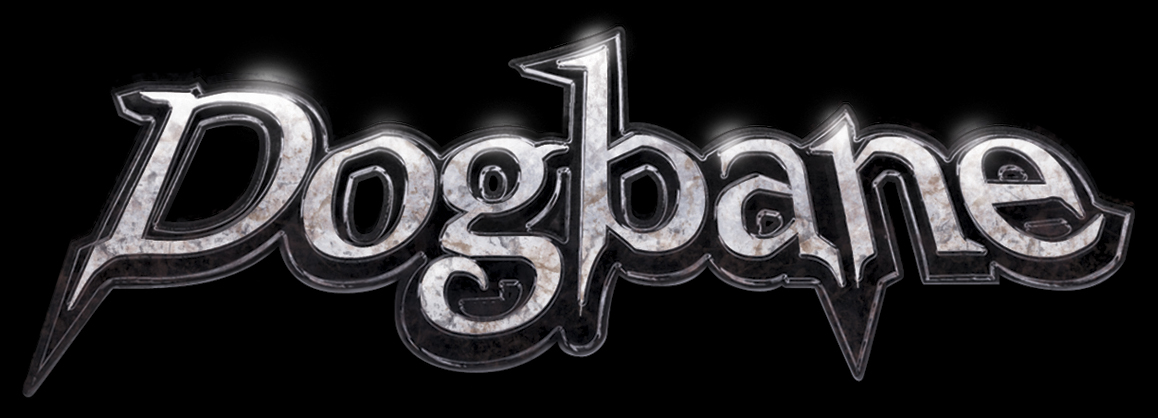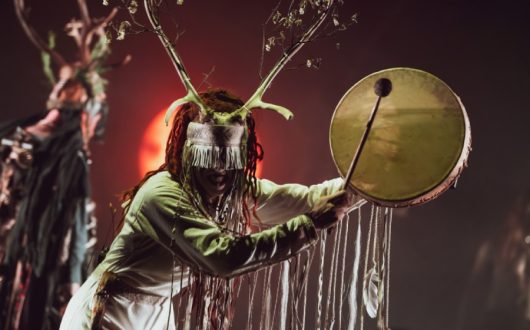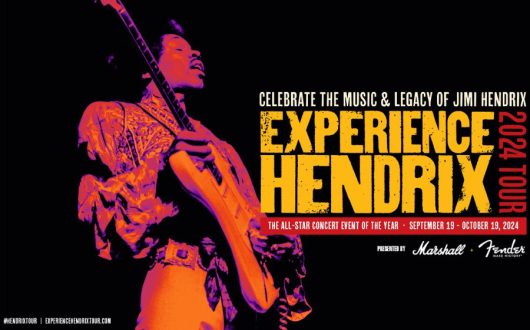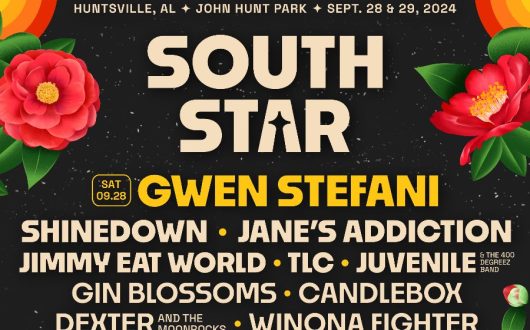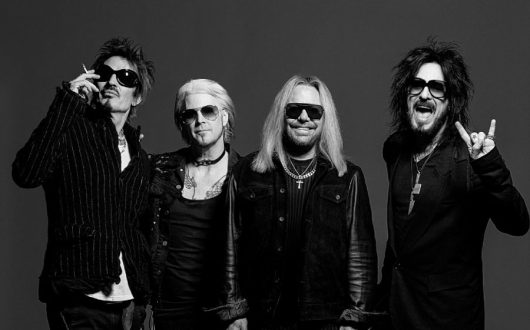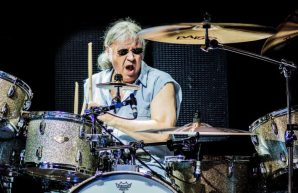Interview by: Chris Martin
Recently we were able to have a brief chat with Jeff Rinehart and Mitchell Allred of Dogbane.
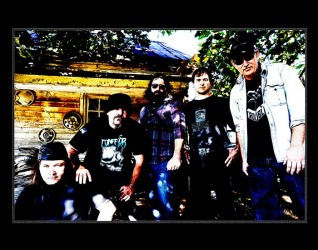
Source: Dogbaneband.com by Jon Upchurch
MGM: How did Dogbane come into existence?
Mitchell Allred: The idea of Dogbane was something that came about at our bass player Kevin Davis’s studio. Kevin was recording Rictus Grin. “Rictus” was David Ellenburg and Jerry Cloer’s band at the time. David approached Kevin about the possibility of a side project. Kevin was game, and after getting on board the guys started looking around for a second guitar player. Kevin brought my name up and we just kind of took things from there. After a few jam sessions we knew it was time to locate a vocalist and Jeff Neal was approached. I know it sounds easy and uneventful, and it was; but, I think that was due to the fact that we all, in an around about way, already knew one another– some of us for many years. The whole process was comfortable and the chemistry was awesome. Then six months after our first release “Residual Alcatraz”, David suffered a stroke following a show in Fayetteville, N.C. a week later David passed away. Naturally there was period of uncertainty, and we struggled a bit. We had auditioned a number of guys, who for various reasons, just didn’t work out. After about 7 months of looking, our bass player, Kevin, searched a musician classified website and came across a guy none of us had heard of before who listed many similar musical influences. Kevin emailed him to ask if he’d be interested in auditioning. That guy was Jeff Rinehart, and to his credit Jeff showed up to his audition well prepared. Jeff was offered the
in just a few days and things have been progressing ever since; to the point of releasing our second album “When Karma Comes Calling” this past June.
MGM: The band has dealt with adversity in the past, could you tell us a bit about that and how the band has overcome this?
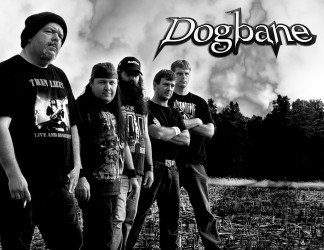
Source: Dogbaneband.com by Linda Ronsick
Mitchell Allred: Yes, as I already mentioned, we lost David in August of 2012. We had played a show the previous night with Overlord SR. I had stayed overnight after the gig and the rest of the guys headed for home. That next day David spent the afternoon mowing in the heat. The amount of ground he had to cover was considerable and it was extremely hot. I guess the overexposure set off a series of symptoms that led to his stroke several hours later. Everyone was in shock. In some ways we still are. I guess that could be characterized as adversity, as it certainly made things difficult. Realistically it’s just life. These things happen, and they happen to people every day. There aren’t but two choices when they do… and that’s quit or keep going. Life is for the living. David wouldn’t have wanted us to quit, and after the mourning process had ended the end goal was to put out an album David would have been proud of and I think we did that. Making “Karma” is what helped us overcome our adversity. The best way to combat any adversity is to get back to work. One day, something may put an end to Dogbane, but we were resolute that David’s passing wouldn’t be that thing. Dogbane still has something to prove.
MGM: What are the biggest influences musically on the band?
Mitchell Allred: The answer to that particular question will differ depending on who you ask. I think it would be safe to say classic metal, especially the NWOBHM era along with Black Sabbath and Thin Lizzy. One would also have to give a nod to early American doom bands such as Saint Vitus and Cirith Ungol among others. We all have pretty extensive album collections which contain all genres of music, so there is potential for a lot of different elements. One may also get a southern rock influence from some our tracks.
Jeff Rinehart: I would just add that while we are often compared musically to some of the front runners of American Doom. traditional and NWOBHM, we tend to be influenced a lot in our writing and musicality by bands such as Judas Priest, Trouble, Iron Maiden, and Thin Lizzy. I personally feel most influenced by King Diamond, Mercyful Fate, and My Dying Bride. Like Mitch said though, we have so many common overlaps influentially, that it can be interesting to see how we blend things together in combination.
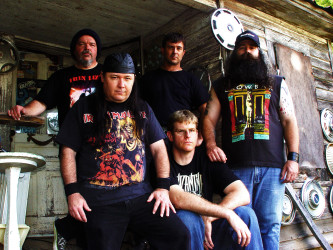
Source: Dogbane.com by Linda Ronsick
MGM: There is definitely an old school feel and sound to the band. What was the inspiration behind taking that angle?
Mitchell Allred: I’m not sure if it’s so much inspiration, or just what we cut our teeth on while growing up. We all grew up “old school”. Everything we listened to as kids is now “old school”. We are all in our mid to late forties so that may have a lot to do with it. Like I said earlier, we all have massive record collections that contain everything from punk and grind core to blues and country. So it’s not all about being one thing, or trying to sound old school. I just think it’s the classic style of metal that appeals to us when we write. Over the years metal has splintered off into a million different sub genres, but as far as I’m concerned the founding fathers of the genre got it right. I always find myself coming back to the classics. All those bands had hooks, and you could understand the singer. To me those things are important.
MGM: In recent years a more traditional approach has been taken by many bands in the genre; many younger bands making this almost a cliché trend of sorts within their music, recording, and even the vertical stripped stretch pants that many sport.
Mitchell Allred: You are correct that trying to sound old school has become a thing in recent years. People may even accuse Dogbane of this. I’ve read that some folks think we intentionally make our albums sound this way. In reality we just record with what we have, and just like us the equipment is old. We just try to do the best we have with what we’ve got. As far as younger bands grabbing on to the “old” way, I don’t necessarily think that it’s a bad thing. They get a certain kind of respect from me because they have a sense of history. They’ve taken the initiative to research their music, and if they want to dress the part more power to them, although Dogbane’s days of striped stretch pants are long gone.
Jeff Rinehart: I would agree in part with Mitch, in that we do try to handle our recording and sound “in-house” as much as possible, on a limited budget. We also do try to be intentional with maintaining a warm analog sound. However, while that does factor somewhat into the sound, I will point out that we do have the capability to use digital recording and actually did rely on it more this go around, when recording Karma.
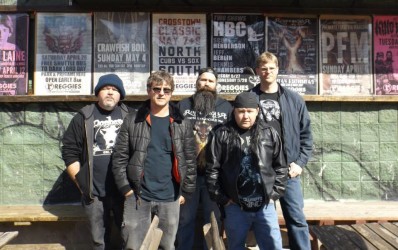
Source: Dogbane Facebook
MGM: How do you perceive this trend and where do you see Dogbane fitting into all this?
Mitchell Allred: I don’t have a problem with this trend at all, but being a trend it will run its course and when it does, it will fade until it becomes fashionable again. I just see Dogbane continuing on doing what we do even after the trend passes. We will just keep making the style of music we enjoy, and if we happen to get a rub off “old school’s” current upswing all the better.
Jeff Rinehart: I think that while we will try to maintain the integrity of our sound as having that old school “analog” warm sound, we will continue to learn from mistakes and constructive criticism about how to marry the digital technology and analog technology to refine our sound in future recordings. I think that by virtue of that fact, we may not necessarily fit with the trendiness of the retro-movement, nor would we ever be accused of sounding modern, and might just stand out more as marching to the beat of our own drum, not because it’s trendy, but because we have a certain sound we are trying to capture.
MGM: Your first album ‘Residual Alcatraz’ was released in 2011 on Heaven and Hell Records. What is the story behind the album name? How was it writing and recording that album?
Jeff Rinehart: As I understand it, the album name “Residual Alcatraz” came about in reference to the popular reality TV buzz about ghost hunters and residual hauntings. The song itself and thus the album deals with all the negative vibes that have got to be left over in a place like Alcatraz, with such a history for violence and death within its walls. Even though the place has been shut down and abandoned, it still has that heavy atmosphere in it.
Mitchell Allred: The way “Residual” was recorded was different than anything I had been a part of before. Usually a band writes some material goes out and plays a few shows, and after a period of seasoning the songs you eventually get things recorded in the studio. We did the exact opposite. We formed a new band, got most of the songs together and then went straight into recording mode. We were still in the writing process as the album was being recorded. When I tracked my guitars for Link Wray’s “Fire and Brimstone I got to the studio early one Saturday. I learned the song that morning and after only a couple practice runs we recorded it. “Residual” had already been recorded and released and the band had yet to do its first show. It was a completely new experience for me and the rest of the guys.
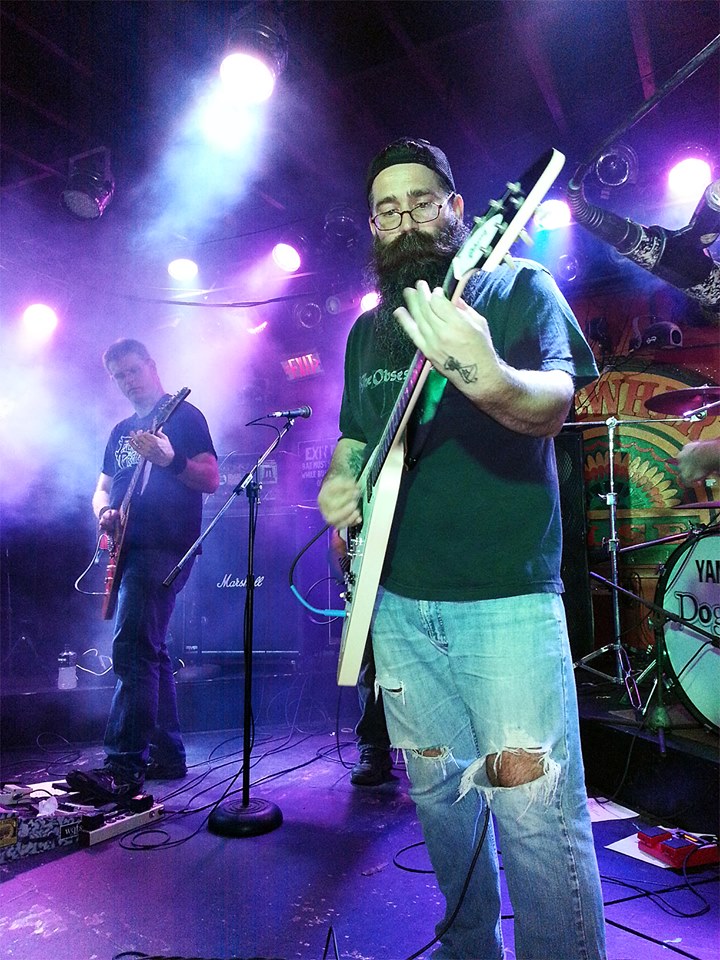
Source: Dogbane Facebook
MGM: Your next and most recent album, again released through H&H Records ‘When Karma Comes Calling’ came out this year, and is phenomenal. Did the band make any significant changes in the writing and recording process for this one?
Jeff Rinehart: Three of the songs on this album were written and fairly structured prior to the time I joined the band (Deceiver, Dogbane, and Devil by the Horns). We continued to work on refining and adding lead parts and made minor arrangement changes to them during rehearsals between April and July 2013. The remaining 5 songs were written between July 2013 and May 2014. Ideally, we tried to test songs out live once we had them in playable form, which really helped to tighten them to a point they were strong by the time we recorded, but not all the songs had that much time to be road tested. We started recording around May 2014 and finished probably mid October 2014, and recorded all the tracks in our bass player’s studio, which also is our rehearsal space. Recording was a bit of a learning process on this album, as Kevin was recording the initial instrument signals digitally, instead of using the old ADAT tapes, as compared to him recording the instruments on the first album by tape and then running them through digitally during the mixing process to digital files. However, we also used an Analog mixing board and ADAT effects to warm up the sound and recorded our instruments live with miked amps and drums (except for the bass which was recorded direct).
MGM: Some tracks on the new album show a new writing direction such as ‘Free Spirit’. Is this just an addition to the Dogbane sound or is the band slowly moving into a new direction.
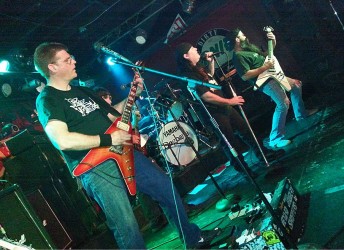
Source: Dogbane Facebook
Jeff Rinehart: Well, I guess I have to claim responsibility for “Free Spirit”. That was the second song I brought to the table specifically for Dogbane, the first of which was “Sands of Time” (which was a previously written, unused song that had to be reworked to fit more into a compatible, albeit better vibe with Dogbane), and the third of which was “Warlord”. I was encouraged to write and bring in material musically and lyrically, so I definitely wrote “Free Spirit” with some of the common ground influences of Mercyful Fate and King Diamond in mind, with the band’s blessing. We had discussions early on in the writing process of my being a contributing member of the band, but I also personally felt a responsibility to honor what had been laid down stylistically before I came to the band; while also writing material that expanded into compatible, but slightly uncharted territory with the band. So, personally I feel that the second album was a natural progression from the first, as we still had songs with some of the same influential references, but also included other influences from the same genre, that just broadened and matured our musical wellspring. I think we definitely were trying to branch out musically, but I don’t think any of us would agree that it was in a “new direction”. I would say it might be a bit premature to categorize or pigeonhole a band as having defined their sound with no room to expand, experiment, or grow musically after only one album. But I guess it’s also natural for that sound to change when different members, like me come in. We have tried to maintain some sense of balance and consistency between the two albums, by including material that David had written and recorded at least in demo form with Dogbane, as he was such a strong contributing force to the music writing process from the formation of the band. Don’t be surprised to find material he contributed musically on the next album either.
MGM: What songs resonate on a personal level for you from either album? If it differs, are there songs you love playing live the most? Why do these songs strike you so much more?
Jeff Rinehart: Well, I have to say I have a personal bias for the songs I wrote (or had a large contribution with writing) on “When Karma Comes Calling”. On the first album, the song that resonates with me personally is “Banished”. “Banished”, “Ride the Serpent”, and “Annihilator”, are my favorite songs from the first album to play live because they have such a tight and powerful live feel and are always crowd favorites. From the second album, I love to play “Free Spirit”, “Warlord”, “When Karma Comes Calling”, and “Deceiver” live. Free Spirit probably resonates the most with me personally because it was one of those rare songs, where I felt I had written strong lyrics and strong music that synergistically flowed together, and it came out the way I envisioned it as a powerful, dark, compelling story set to music. I was also proud of my contribution to the song “When Karma Comes Calling”, because of how we were able to take riffs that David wrote and blend them with riffs I wrote to really come up with a doomy song in the vein of Trouble. That song was also very important to Jerry, our drummer, who wrote the lyrics and definitely wanted to salvage it for the album.
Mitchell Allred: My favorites tend to vary and I bounce back and forth from track to track over both albums. Some songs are better to play live just because the crowd’s reaction to them. For instance, on our self-titled track “Dogbane”. When the breakdown hits, and all at once the whole room is nodding their heads back and forth in unison is very powerful to watch, or when myself and Mr. Rinehart lock into our harmonies on “Karma” and you can tell by the looks on everyone’s faces that you’ve captured their attention. Those kinds of things send chills down my spine. I also have a soft spot for both “Ride the Serpent” and “Devil by the Horns”. I wrote those two tracks and for whatever reason they seem to get a lot of play on radio and certain websites, and that makes me very proud.

Source: Dogbane Facebook
MGM: On the debut you paid tribute to rock/guitar legend Link Wray by covering the song ‘Fire and Brimstone’; what inspired such a unique idea of a cover song and did the fact of Wray being from North Carolina have anything to do with the choice?
Mitchell Allred: Sure, being from North Carolina did play a small part in choosing to cover Link Wray. However, that was secondary to the fact that we absolutely love the guy. To us (especially Jerry, Kevin and me) he is the father of distortion. Link never got the credit he deserved for his contributions to rock-n-roll and any homage that is paid to him is long overdue. We also wanted to do a cover no one else had done, and one nobody would expect us to do. I also did a video for “Fire and Brimstone” and it is one of our most watched. I also tried to draw attention to the fact Link was on the ballot to be voted into the Rock and Roll Hall of Fame. His induction never came to fruition, but it usually never does for those most deserving.
MGM: Dogbane is outstanding live. Why is it so natural for you guys to play on stage?
Jeff Rinehart: I appreciate your high praise, but I’m not exactly sure we are always deserving of it. I think, like any band, we have off nights, but with that said, most nights that we might feel a little off, usually our mistakes are not noticed by the crowd, even though they might be blatantly obvious to us. I also think that our music as a whole is much more grounded in traditional heavy metal or doom metal so we tend to lock into grooves and hooky riffs, rather than flashy techniques. In all seriousness to your question though, I think the music is very catchy, and we enjoy playing it, and find that many people at live shows get into it, which is rewarding to us to try to play and deliver our best performances. I think there is a good chemistry amongst us to where we are able to lock in pretty well with each other. Plus we have all lived enough life to not be overwhelmed by stage anxiety and just use the adrenaline and go with it.
Mitchell Allred: I think it has to do with the fact that in some form or fashion we’ve all been playing for twenty plus years. Granted not all that time has been spent with Dogbane, but during those years there have probably been hundreds of shows with other bands and friends. I think there is a comfort level once you reach a certain point. We probably don’t move around as much as we used to, but once the show starts we are definitely at home.
MGM: How would you explain to someone that has never heard your music to convince them to check you out? What sets you apart from other bands out there in the metal world?
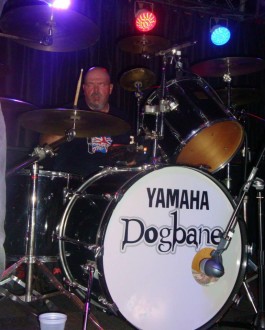
Source: Dogbane Facebook
Jeff Rinehart: I think if someone enjoys traditional, doom, NWOBHM music from the 70’s-80’s era, (Judas Priest, Black Sabbath, Iron Maiden, Trouble, Thin Lizzy, Mercyful Fate etc.) then they will hear enough things that inspire nostalgia to give us a chance. Once that happens, I think they hopefully will hear enough blending of our influences in an original interpretation to appreciate that we try to write and perform songs that each stand on their own and have heavy riffs and catchy hooks.
Mitchell Allred: If one can appreciate no frills classic styled metal I don’t think we would disappoint them. We do our best to come from an honest place. First and foremost we are fans of heavy metal and we try to do the genre justice. I think the majority of metal heads can recognize this and can connect with Dogbane on that level.
MGM: The music business is tough to be in. What are the biggest rewards you take away from making music?
Jeff Rinehart: I think the biggest reward for me is seeing how our music is being played on radio stations domestically and in other countries, and people in countries across the world have gotten ahold of and enjoyed our music.
Mitchell Allred: My biggest reward is putting out “real” albums. Before Dogbane I spent 20+ years putting out albums and demos with really no place to go with them. Things have really changed in that regard. In the end things are still a struggle, but just knowing we are leaving a mark in certain countries and reaching all sort of different people make those struggles worthwhile. I would like to think we are leaving some type of legacy behind.
MGM: Are there any bands that you have shared the stage with that stand out the most for you? What is the one band that, if you couldn’t do a full blown tour with, that you would love to be able to play with?
Jeff Rinehart: For me, the biggest thrill was going to the Ragnarokkr Festival in 2014 and seeing the Skull (at the time with 3 former Trouble members) play a brief set of Trouble songs live. When I heard the opening riff for “The Tempter”, that was such a rush! Well, if we are talking Christmas wish lists of bands, in an ideal world, I would love to open for King Diamond.
Mitchell Allred: I agree with Jeff about playing Ragnarokkr Metal Apocalypse. In addition to the Skull, Riot V headlined the night we played. The following night was headlined by a reunited Steve Grimmett and Nick Bowcott of Grim Reaper. I can remember looking out from the second stage the night we played and seeing most of the guys from both bands watching our set. It was an incredible feeling performing in front of them. We’ve also been very fortunate to play with Overlord SR on a couple of occasions. We were also asked to play False Prophet’s reunion show with Confessor, and most recently we opened for King’s X. These have all been wonderful experiences. However, if it came down to a wish list I would love to do a show with a NWOBHM era band such as Saxon, Iron Maiden and Judas Priest. I would also love to play alongside of US doom legends Saint Vitus and Pentagram.
MGM: What are the long term plans for Dogbane?
Jeff Rinehart: Well, considering our age, long term might be a relative term (laugh.) Not that we’re necessarily old by music standards (laughs) but we don’t try to think in terms of 10 year prospect as plans or anything. However, in the immediate future, we are working on new album material and trying to continue playing bigger and better shows, getting into venues we haven’t played in yet, establishing ourselves as a solid support act for statewide venues and national bands, networking with bands, club owners, and promoters locally and regionally, playing some big national festivals, refining and maturing our music and getting it out there to build a cult following.
MGM: As a new band getting started what are some things that would’ve helped you out to know in the beginning? What are some things you have learned from your time making music that you would pass on to upcoming bands?
Jeff Rinehart: Trusting our judgment in knowing our own music best and how we want it to sound is an important lesson. I think it helps to have a sense of integrity and try to treat people decently in this business, even though it’s not guaranteed that you will always get that in return. We have tried to build up a reputation as decent people who enjoy playing our music, our way, but also have tried to build genuine friendships or working relationships, which have a way of mutually paying off in the long run for everybody to reach their goals. It’s easy to get caught up in drama and politics; but, having a clear vision of how to improve yourself without selling out your principals, or stepping on people’s backs is important. I think trying to focus on the big picture and all the detailed aspects of how you want your band to function is important. We personally want to maintain as much creative freedom and control as we can, so we prefer to do as much of the band business internally as possible (flyers, promotion, recording, booking shows handling the merchandise). Having everybody weigh in on goals regularly is important to keep everybody on the same page and be able to move together in the same direction. We tend to run our band democratically, which we find works best for us. We probably tend to be realists by the fact that we consider the band doesn’t always take precedence, as we have steady jobs and families to support, so the time and energy and quality we put into the band may be slow tracked but is intentional and committed. We aren’t looking to sell the shirts off our back in order to be rich and famous, and we try to make wise business decisions under the motto of “work smarter, not harder”.
Mitchell Allred: Make the most of the small things. If you get an opportunity to do interviews or write columns, do them, and do those things to the best of your ability, and in a timely fashion. Stick to your guns and stay true to what you do, but always listen to honest criticism and address those weaknesses. Be serious in everything, but don’t take yourselves too seriously, and be honest in your expectations. 95% of all bands fail. Keep that in mind. Most importantly have fun. Chances are that’s why you got into a band in the first place. Once you start gaining ground, things tend to shift into more of a business model and that can potentially suck the fun right out of it. Last, but certainly not least, be flexible; especially when it comes to your bandmates. You’re not going to always agree on what’s best, so be willing to work with each other in that regard. Unfortunately the odds are against you, and it’s very important to know that going in.
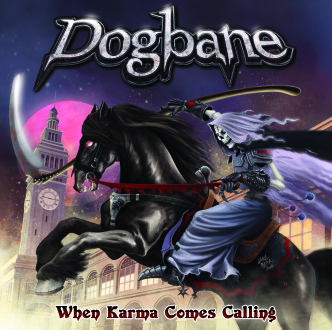
Follow Dogbane on:
